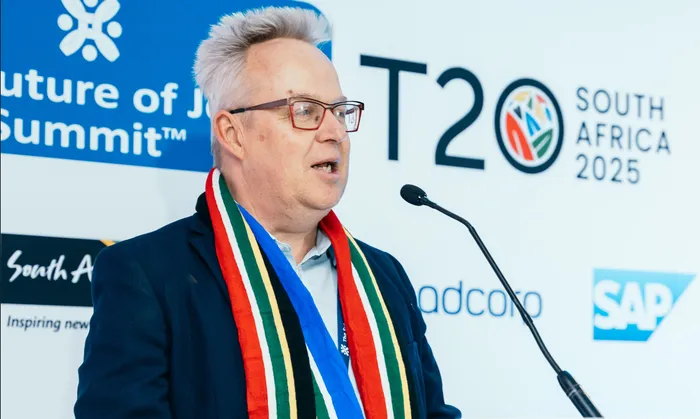South Africa’s national dialogue: Why business cannot sit on the sidelines

Dr Nik Eberl is the Founder & Executive Chair: The Future of Jobs Summit™ (Official T20 Side Event) .He will be writing a regular column in Business Report.
Image: Supplied
When President Cyril Ramaphosa announced a National Dialogue on Poverty, Inequality, and Crime earlier this month, it was billed as nothing less than a reset of our democratic project. Forty million rand has been allocated to convene stakeholders from across society to address the country’s systemic failures—from unemployment to corruption to the breakdown of public services.
Yet, the reception has been mixed. Two major opposition parties have boycotted the process, calling it political theatre. Civil society voices have questioned whether the dialogue will lead to action or simply more words. Business, for its part, has been largely muted—watching from the sidelines, waiting to see what comes of it.
That silence is a mistake.
Why This Dialogue Matters to Business
South Africa’s economic health is inseparable from its social stability. Investors, shareholders, and workers all know this: no company can thrive in an environment of rolling blackouts, water shortages, rising violent crime, and record-high unemployment.
- The economic costs are staggering: crime alone wipes tens of billions off GDP annually.
- Johannesburg’s water crisis threatens operations and supply chains.
- U.S. tariffs on exports and sluggish local demand squeeze margins further.
The dialogue is not just a political process; it is a business-critical platform. If it succeeds in charting a path to reform, business gains a more stable environment for growth. If it fails, the private sector will face even deeper instability, reputational risks, and investor flight.
What Business Should Bring to the Table
Business cannot afford to be a passive observer. The private sector has a unique vantage point and responsibility in making the dialogue credible. Here are four imperatives:
1 Move Beyond Lobbying to Leadership
For too long, the relationship between government and business has been transactional—focused on regulation, tax, and incentives. Now is the time to frame bold proposals: how to turn trade tensions into opportunities, how to accelerate green energy investment, how to reform vocational education for a youth bulge that is currently excluded from the economy.
2 Put Job Creation at the Centre
South Africa’s crisis is fundamentally a jobs crisis. With youth unemployment above 60%, no dialogue can succeed unless it delivers pathways to work. Business can champion models of enterprise development, supply chain inclusion, and sector-specific growth (from automotive to digital industries) that directly absorb and upskill young South Africans.
3 Harness Technology to Include Every Citizen
A true national dialogue cannot be limited to hotel conference rooms and closed-door summits. Every South African—whether in Sandton or in Sekhukhune—must have a voice. That requires leveraging digital platforms, mobile polling, online town halls, and community radio linked to tech-enabled feedback loops.
Business has the know-how and infrastructure to make this possible. Telcos, banks, fintechs, and technology firms can help design an inclusive digital process where ordinary citizens are not just spectators, but participants shaping the country’s future. Without this, the dialogue risks becoming elitist and irrelevant.
4 Demonstrate Ethical Leadership
Trust is in short supply. Scandals—from state capture to Bain’s recent withdrawal—have left many South Africans deeply sceptical of both government and business elites. If business leaders participate in the dialogue, they must do so with transparency, accountability, and a commitment to shared prosperity, not narrow corporate gain.
Lessons from Codesa
South Africa has a living memory of how dialogue can reshape a nation. In the early 1990s, the Convention for a Democratic South Africa (Codesa) brought political opponents, business leaders, civil society, and communities around the same table. It was far from perfect—walkouts, deadlocks, and mistrust were part of the process—but it proved a powerful truth: that progress only happens when everyone believes they have a stake in the outcome. The lesson for today’s national dialogue is clear—exclusion breeds resistance, while inclusion, even if messy, builds legitimacy and buy-in.
At Codesa, Business leaders were not neutral bystanders; they provided resources, mediated tensions, and built confidence in the economic future of a democratic South Africa. Their quiet diplomacy and active participation created a bridge between political aspirations and economic realities. The same is true today. Business cannot afford to sit on the sidelines of the new national dialogue—it must lean in as a partner, not a spectator, helping to shape solutions that are economically viable and socially just.
The Risk of Another Talk Shop
Sceptics are right to worry that the National Dialogue could become another “indaba economy”: expensive conferences that produce glossy reports but little change. South Africa does not lack analysis; it lacks execution.
Business can play a decisive role here by:
- Insisting on timelines and measurable outcomes.
- Offering technical expertise in logistics, finance, and project management to ensure implementation.
- Harnessing technology to capture citizen sentiment in real time and make decision-making transparent.
If the dialogue ends with another report gathering dust, both government and business will have squandered a rare chance to restore public trust.
A New Social Compact—or a Last Chance?
The stakes are high. In 2025, South Africa faces a convergence of pressures: G20 hosting duties, potential FATF delisting, crippling tariffs from the U.S., and mounting infrastructure failures. The National Dialogue could become a platform for a new social compact—aligning government, business, and civil society around a shared vision of inclusive growth.
Or it could be remembered as another missed opportunity.
The choice is not only government’s. It is also business’s.
Dr Nik Eberl is the Founder & Executive Chair: The Future of Jobs Summit™ (Official T20 Side Event) and author of Nation of Champions: How South Africa won the World Cup of Destination Branding.
*** The views expressed here do not necessarily represent those of Independent Media or IOL.
BUSINESS REPORT